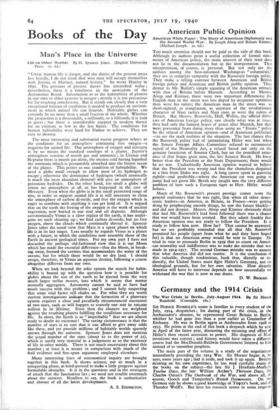American Public Opinion
American White Paper : The Story of American Diplomacy and the Second World War. By Joseph Alsop and Robert Kintner. (Michael Joseph. 25. 6d.) Too much attention should not be paid to the title of this book. Although its authors print a useful collection of formal state- ments of American policy, the main interest of their tract does not lie in the documentation but in the interpretation. That interpretation, of course, is personal. But not only are the authors among the best-informed Washington " columnists," they are in complete sympathy with the Roosevelt foreign policy. They make a telling contrast between American and British foreign policy and American and British public opinion. They demur to Mr. Bullitt's simple equating of the American attitude with that of Britain before Munich. According to Messrs. Alsop and Kintner, there were two important differences; the English man in the street was less doped by desperate optimism than were his rulers; the American man in the street was as short-sighted, as complacent, as unaware of the revolutionary character of Nazi tactics and Nazi aims as were the rulers of Britain. But Messrs. Roosevelt, Hull, Welles, the official direc- tors of American foreign policy, saw clearly what was at issue; they had only the faintest hopes of peace after Munich, but they were prevented from doing more than using an " Ersatz " policy by the refusal of American opinion—and of American politicians —to see the stark realities 'of the situation. The last chance that the Roosevelt policy had of intimidating Hitler was lost when the Senate Foreign Affairs Committee refused to recommend repeal of the Neutrality Act, a refusal based not only on the genuine fanaticism of Senator Clark, but on the pontifical assur- ance of that bogus great man, the late Senator Borah. He knew better than the President or the State Department; there would be no war. Undoubtedly American opinion wanted to believe that the President was wrong and that the chameleon disguised as a lion from Idaho was right. A long career spent in guessing rightly—and profitably—where the American cat was going to jump had not given Mr. Borah any insight into the very different problem of how such a European tiger as Herr Hitler would behave.
Much of Mr. Roosevelt's present prestige comes nom the general realisation that he was right, that when all other demo- cratic leaders—in America, in Britain, in France—were getting along by prophesying smooth things, he saw the future blackly— and did not despair. Messrs. Alsop and Kintner obviously think that had Mr. Roosevelt's lead been followed there was a chance that war would have been averted. But they, admit frankly that American opinion was not ready to follow the President. It is ready to follow him now. How far?. That cannot be answered, but we are profitably reminded that all -that Mr. Roosevelt promised his people (apart from what he and they have hoped for) is that no American army would be sent to Europe. He tried in vain to persuade Berlin in 1939 that to count on Ameri- can neutrality and indifference was to make the mistake that was made in 1914-1917. The second German mistake was to assume that what America did did not matter. It is the conclusion of this valuable, though tendentious, book, that, directly or • in- directly, the United States must fight Hitler's Germany, not on ideological grounds, but for her own salvation. How directly America will have to intervene depends on how successfully we withstand the war ' that is now at our doors.
D. W. BROGAN.


































 Previous page
Previous page